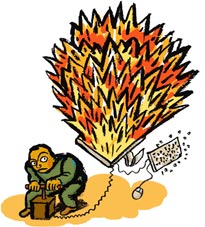
THE bomb hit the ABC's headquarters, destroying everything except one digital transmission tower. The force of the blast left Aunty's site a cratered mess.
Just weeks before, a group of terrorists flew a helicopter into the Nissan building, creating an inferno that left two dead. Then a group of armed militants forced their way into an American Apparel clothing store and shot several customers before planting a bomb outside a Reebok store.
This terror campaign, which has been waged during the past six months, has left a trail of dead and injured, and caused hundreds of thousands of dollars' damage. The terrorists belong to a militant group bent on overthrowing the government. But they will never be arrested or charged for their crimes because they have committed them away from the reach of the world's law enforcement agencies, in the virtual world known as Second Life.
Read More





